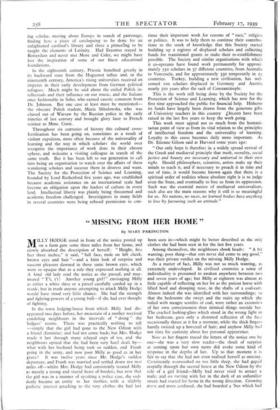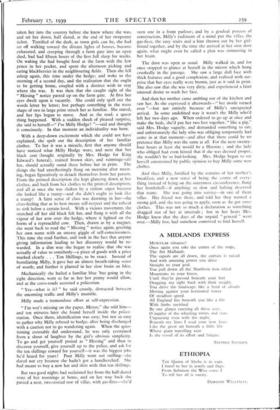" MISSING FROM HER HOME "
By MARY PAKINGTON
MILLY HODGE stood in front of the notice posted up on a farm gate some three miles from her home, and slowly absorbed the description of herself : " Height, five feet three inches," it said, " full face, mole on left cheek, brown eyes and hair "—and a faint look of surprise and nascent pleasure dawned in those same brown eyes, which were so opaque that as a rule they expressed nothing at all. A kind old lady read the notice as she passed, and mur- mured " T't, t't! Another young girl!" envisaging Milly as either a white slave or a parcel carefully corded up in a trunk; but in truth anyone attempting to attack Milly Hodge would have stood very little chance. She had the strength and fighting-powers of a young bull—if she had ever thought of fighting.
In the town lodging-house from which Milly had dis- appeared two days before, her mountain of a mother received condoling neighbours in the intervals of " doing " the lodgers' rooms. There was practically nothing to tell —simply that the girl had gone to the New Odeon with a friend (feminine) and had not come back; but Mrs. Hodge made it last through many relayed cups of tea, and the neighbours opined that she had been very hard dealt by— what with her husband being took so sudden, and Frank going in the army, and now poor Milly as good as in her grave! It was twelve years since Mr. Hodge's sudden departure, and Frank was married and settled down not two miles off—whilst Mrs. Hodge had consistently treated Milly as merely a strong and stupid beast of burden; but new that the girl was in a manner of speaking a police case, she sud- denly became an entity to her mother, with a slightly pathetic interest attaching to the very clothes she had last been seen in—which might be better described as the only clothes she had been seen in for the last five years.
Among themselves, the neighbours shook heads: " A bit wanting, poor thing—that sort never did come to any good," was their private verdict on the missing Milly Hodge.
As a matter of fact, Milly was not so much wanting, as extremely undeveloped. In civilised countries a sense of individuality is presumed to awaken anywhere between two and seven years of age; but Milly at eighteen was almost as little capable of reflecting on her lot as the patient horse with lifted hoof and drooping nose, in the shafts of a coal-cart. Almost indeed she was identified with her surroundings; f.0 that the bedrooms she swept and the stairs up which she toiled with meagre scuttles of coal, were rather an extension of her own consciousness than inimical things outside her. The cracked looking-glass which stood in the wrong light in her bedroom, gave only a distorted reflection of the fac occasionally thrust at it for a moment, while the thick fingers hastily twisted up a horsetail of hair; and anyhow Milly had not time for curiosity about her personal appearance.
Nov as her fingers traced the letters of the notice one by one—she was a very slow reader—the shock of surprise at coming upon her own name did evoke some kind of response in the depths of her. Up to that moment it is fair to say that she had not even realised herself as missing. Consistently overworked on too little sleep, she had gaped stupidly through the second house at the New Odeon by the side of a girl friend—Milly had never tried to attract a male; and on na-ring with her in the dark of an unfamiliar street, had started for home in the wrong direction. Growing more and more confused, she had boarded a 'bus which had taken her into the country before she knew where she was, and set her down, half dazed, at the end of her twopenny ticket. Terrified of the dark, as town girls can be, she had set off walking toward the distant lights of houses, become exhausted, and creeping through a farm gate into an open shed, had had fifteen hours of the first full sleep for weeks. On waking she had bought food at the farm with the few pence in her pocket, and spent the afternoon picking and eating blackberries in the neighbouring fields. Then she fell asleep again, this time under the hedge; and woke to the morning of a second day, and the realisation that she ought to be getting home, coupled with a distinct wish to stay where she was. It was then that she caught sight of the " Missing " notice pasted up on the farm gate. At first her eyes dwelt upon it vacantly. She could only spell out the words letter by letter; but perhaps something in the mere shape of two in large print struck her as familiar. She stared, and her lips began to move. And as she read, a queer thing happened. With a sudden shock of pleased surprise, she said to herself—"/'m Milly Hodge! "—said and thought it consciously. In that moment an individuality was born.
With a deep-down excitement which she could not have explained, she spelt out the description of her familiar clothes. To her it was a miracle, first that anyone should have noticed what Milly Hodge wore, and next that her black coat (bought originally by Mrs. Hodge for King Edward's funeral), stained brown skirt, and rummage-sale hat, should actually stand there before her in print. The things she had unreflectingly flung on morning after morn- ing, began figuratively to detach themselves from her person. From the printed description she kept glancing down at her clothes, and back from her clothes to the printed description; and all at once she was shaken by a violent anger because she looked like a tramp—and she didn't ought to look like a tramp! A faint sense of class was dawning in her—the class-feeling that at its best means self-respect and the refusal to sink below a certain level. With a vicious movement, she snatched off her old black felt hat, and flung it with all the vigour of her arm over the hedge, where it lighted on the horns of a reproachful cow. Then, drawn as by a magnet, she went back to read the " Missing " notice again, greeting her own name with an uneasy giggle of self-consciousness. This time she read further, and took in the fact that anyone giving information leading to her discovery would be re- warded. In a dim way she began to realise that she was actually of value to somebody—a piece of goods with a price marked clearly . . . Ten Shillings, to be exact. Instead of humiliating Milly, it gave her an almost breath-taking sense of worth; and further it planted in her slow brain an Idea.
Mechanically she hailed a familiar blue 'bus going in the right direction, went as far as her last penny would allow, and at the cross-roads accosted a policeman.
" Yes—what is it? " he said crossly, distracted between the oncoming traffic and Milly's mumble.
Milly made a tremendous effort at self-expression.
" I'm wot's missing on the paper, Mister," she told him— and ten minutes later she found herself inside the police- station. Once there, identification was easy; but not so easy to gather why Milly refused to budge, after being discharged with a caution not to go wandering again. When the ques- tioning constable did understand, he was only restrained from a shout of laughter by the girl's obvious simplicity. To go and get yourself posted as " Missing" and then to discover yourself, give yourself up to the police, and ask for the ten shillings reward for yourself—it was the biggest joke he'd heard for years! Poor. Milly went out sniffing—she dared not cry because she hadn't got a handkerchief. She had meant to buy a new hat and skirt with that ten shillings.
But two good nights had reclaimed her from the half-dazed state of her mornings at home, and on her way back she passed a neat, two-storied row of villas, with gas-fires—she'd seen one in a front parlour; and by a gradual process of construction, Milly's rudiment of a mind put the villas, the gas-fires, the easy stairs and a hint thrown out by her girl- friend together, and by the time she arrived at her own door again, what might even be called a plan was simmering in her brain.
The door was open as usual. Milly walked in, and for once stopped to glance at herself in the mirror which hung crookedly in the passage. She saw a large dull face with thick features and a good complexion, and realised with sur- prise that her eyes really were brown, just as it said in print. She also saw that she was very dirty, and experienced a faint unusual desire to wash her face.
And then her mother came ambling out of the kitchen and saw her. As she expressed it afterwards—" her inside turned over "—but not entirely because of Milly's unexpected arrival. In some undefined way it wasn't the Milly who'd left her two days ago. When ordered to go up at once and make the beds, she'd put her two feet together, " like a pig," said Mrs. Hodge vaguely, and demanded something to eat; and unfortunately the lady who was obliging temporarily had come in at that moment—and after that there could be no pretence that Milly was the same at all. For the next twenty- four hours at least she would be a Heroine ; and the lady who obliged had even hinted that if she was dressed proper, she wouldn't be so bad-looking. Mrs. Hodge began to see herself constrained by public opinion to buy Milly some new clothes.
And then Milly, fortified by the remains of her mother's breakfast, and a new sense of being the centre of every- thing instead of being on the outermost circumference, flung her bombshell—if anything so slow and halting deserved that name. She was going into service—in one of them villas. Her friend was there, and told her they wanted a strong girl, and she was going to apply, soon as ihe got some clothes. This was not so much a declaration as something dragged out of her at intervals ; but in her heart Mrs. Hodge knew that the days of the unpaid " general " were over.--Milly lost, had somehow contrived to find herself.











































 Previous page
Previous page